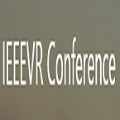Context: Software engineering is becoming more and more distributed. Developers and other stakeholders are often located in different locations, departments, and countries and operating within different time zones. Most online software design and modeling tools are not adequate for distributed collaboration since they do not support awareness and lack features for effective communication. Objective: The aim of our research is to support distributed software design activities in Virtual Reality (VR). Method: Using design science research methodology, we design and evaluate a tool for collaborative design in VR. We evaluate the collaboration efficiency and recall of design information when using the VR software design environment compared to a non-VR software design environment. Moreover, we collect the perceptions and preferences of users to explore the opportunities and challenges that were incurred by using the VR software design environment. Results: We find that there is no significant difference in the efficiency and recall of design information when using the VR compared to the non-VR environment. Furthermore, we find that developers are more satisfied with collaboration in VR. Conclusion: The results of our research and similar studies show that working in VR is not yet faster or more efficient than working on standard desktops. It is very important to improve the interface in VR (gestures with haptics, keyboard and voice input), as confirmed by the difference in results between the first and second evaluation.
翻译:暂无翻译





